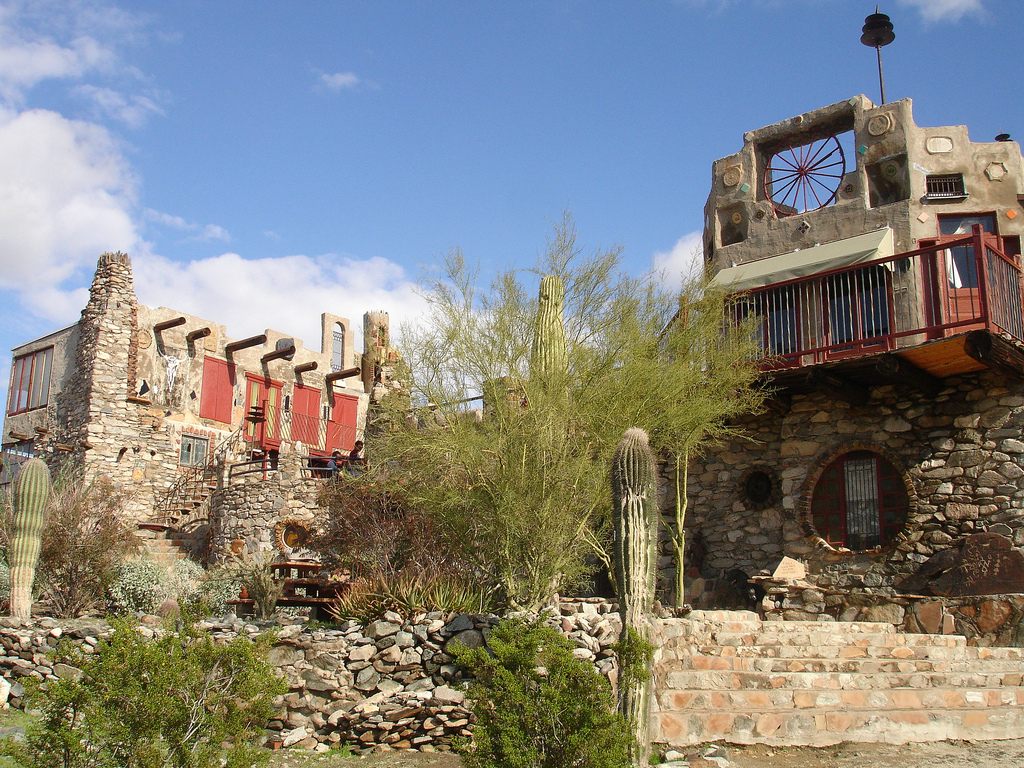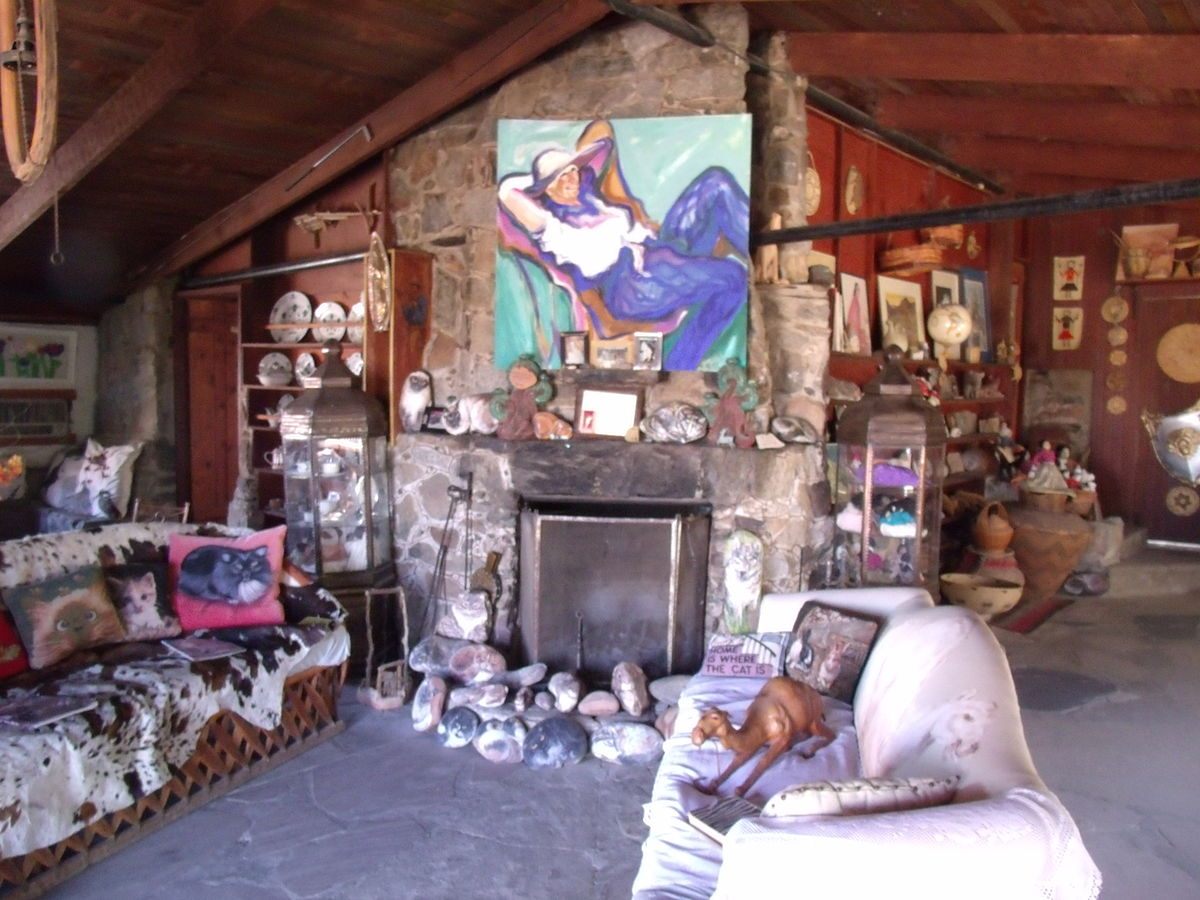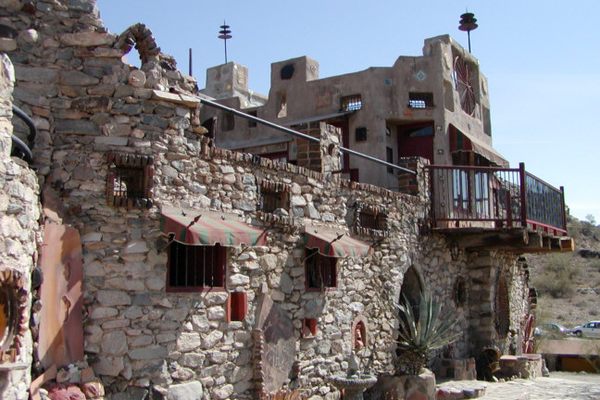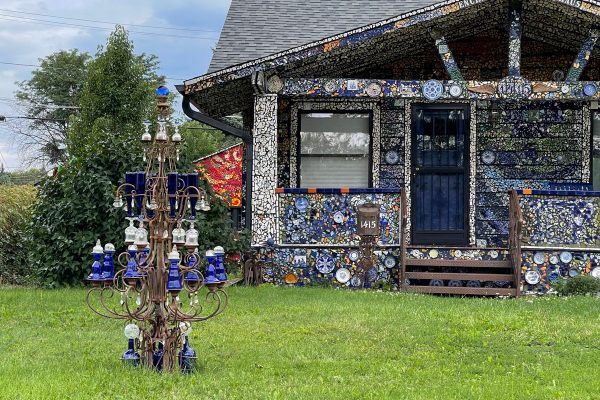The Arizona Trash Castle With a Heartbreaking Secret

Mystery Castle. (Photo: Melissa/flickr)
The biggest mystery concerning Phoenix, Arizona’s Mystery Castle is why someone would want to build an 18-room palace out of rocks and trash.
We already know who built it: Boyce Gulley, a mostly self-taught architect from Arkansas by way of Washington state. We know how he built it: from stone and sand and water hauled in from miles away, so as not to destroy the surroundings, padded out with bric-a-brac like car parts, glass dishes, and old blackboards.
But it turns out the Mystery Castle is also the site of a strange yet heartbreaking tale. Hewn from the detritus of life, it’s a memento to lost fathers, kept promises, and letters from beyond the grave.

This outdoor staircase features salvaged stained glass and telephone pole beams. (Photo: Roger Hsu/flickr)
Until Mary Lou Gulley was 22, she had no idea that her father was building a chimerical mansion. In fact, she wasn’t even entirely sure he was alive. Boyce Gulley abandoned his family in 1929, when Mary Lou was five years old. He didn’t disappear completely—he exchanged some letters with his wife and daughter—but he never returned to Seattle, and they believed he had deserted them to follow his dreams of being an artist.
In 1945, Mary Lou got a letter from her father, whom she hadn’t seen for 16 years. He’d left, he told her at last, because he’d been diagnosed with tuberculosis, and didn’t want to be a burden on his family. “It wasn’t art I wanted,” he wrote, “it was you.”
The dry air of Arizona, often prescribed for tuberculosis patients, had been more effective than expected, and though he was writing the letter from his deathbed, in the end it wasn’t tuberculosis but cancer that did him in. “The theme song of Arizona,” Mary Lou noted wryly in her memoir, My Mystery Castle, is: “‘I came here umpteen years ago to die, but, oh, look at me now!’”
In the meantime, Gulley’s letter said, he’d built this 18-room trash palace, and now he wanted her and her mother, Fran, to live there. They moved in immediately; after all, it was Boyce’s final gift. In her book, Mary Lou recalls making childhood demands for a castle of her very own. Elsewhere, she said that one of her earliest memories of her father was of him building her sandcastles on the beach, and promising to make her one big enough to live in. Well, here it was.
Fittingly, there is sand in the mix at Mystery Castle—and rocks, and adobe, and a natural cement called caliche, and even goat’s milk. (The milk helps cement and plaster mixtures stick together and makes them easier to work with.) There’s also part of a salvaged car, a 1929 Stutz Bearcat, incorporated into the walls; the windshield is used as a kitchen stove vent, and Gulley made windows out of the wheels, rims, and headlights. The castle features telephone pole beams and a wagon wheel fireplace, and the slate floor of the living room is made of discarded schoolhouse blackboards. There is also a bar and a wedding chapel (both no longer used); their creator called the space between them “Purgatory.”

Today, a metal crocodile that Mary Lou has called “the lizard of Oz” stands guard over the trap door. (Photo: Roger Hsu/flickr)
In many ways, Mystery Castle is the ultimate bachelor pad, customized to Boyce Gulley’s particular preferences. One room features a single trundle bed that can be rolled across the room on tracks if a guest wants to sleep by the window. The oven is high, so you can check the status of your roast without bending down, but the sink is low, so you can sit to do dishes. On the large upper patio, there’s a wishing well, conveniently located above the bar; if you wish loud enough for a cocktail, the bartender can send it up via a dumbwaiter inside the well.
The structure was originally built with 13 fireplaces but no electricity or plumbing. That was not due to Gulley’s idiosyncrasies—the site of the castle was just too far from water or power sources.
But there’s no doubt Gulley always intended to give the castle to Mary Lou. When he left his daughter the castle, Gulley secreted treasures in the walls for her—jewelry, gold nuggets, $74 in dimes and nickels hidden behind a loose brick. He also hid another treasure beneath a trap door in Purgatory, and he told Mary Lou not to open it until she’d lived in the castle for three years.
On New Year’s Day, 1948, a nervous Mary Lou and her remaining family members pried open the door —the lock was so rusted it had to be broken with a chisel. Inside was gold and cash, but also something more precious: a photo of Boyce Gulley taken shortly before his death, a carefully-preserved valentine Mary Lou had given him as a child, and two letters addressed to her.

Artwork by Mary Lou hangs over one of the castle’s 13 fireplaces. (Photo: Tony the Marine/WikiCommons)
Mary Lou describes the letters in depth in her book. One of them was a note explaining why the castle’s cat figurines had been encased in cement. (Gulley had come to believe they were blasphemous and were causing the bad luck that made him ill.) The other was a heartfelt missive from a lost but loving dad:
“You probably thought my request strange and a little unfair, but honey, I had to think of some way to keep you here for awhile … My love for you and Fran is carved on the foundations of the Castle. You see, I hadn’t forgotten my promise to you… Now you have your own castle. Our hours together in front of the fire was the reason I built so many fireplaces. Remember the story of the ‘Princess and her thirteen fireplaces’?…I never forgot, not even for a minute.”
“Castles, Mary, are like life. They aren’t all royal comfort and glitter. There will be days when you will get discouraged…But there will always be a rainbow in every tomorrow, and I leave it up to you to find the end.”
The text of the letter, as reported, sounds almost too good to be true, and it’s possible Mary Lou (who was very much a character) embellished just a smidge. But the substance of her father’s bequest—that the castle was hers, and she was its princess—stayed with her for the rest of her life. Mary Lou lived in the castle and gave tours until her death in 2010, and would refer to herself as Mystery Castle’s princess with earnest enthusiasm.
Mystery Castle is a wonder in and of itself, but even more so for the way the structure and its hidden secret brought a young woman closer to her lost parent. ”He was no longer a mystery man,” she writes, “but just a beloved father with courage and an inordinate love of rocks.”








Follow us on Twitter to get the latest on the world's hidden wonders.
Like us on Facebook to get the latest on the world's hidden wonders.
Follow us on Twitter Like us on Facebook